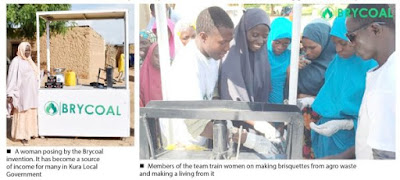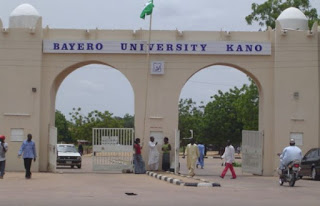BUK Team Finishes Top Eight at 2019 World Hult $1m Prize Competition
;
A team of Nigerian students from Bayero University, Kano (BUK), recently finished in the top eight of the prestigious million dollar Hult Prize for their innovation that is changing lives in Kura Local Government of Kano.
Daily Trust reports on the young scientists, their work, and their remarkable journey to the finals of the world’s biggest student prize.
Abubakar Aminu Adamu, 37, is a native of Mubi, Borno State. Three years ago, he and his family of 11 relocated to Kura in Kano State after being forced out by Boko Haram violence. Having lost his father at 16, he worked at his uncle’s mechanic workshop to provide for his mother and younger siblings. He went on to obtain a Diploma, after which he started working in an aluminum company. Life was a struggle until he applied for a position at Brycoal Factory.
“It was a dream come true for me and it was the new beginning I yearned for. Making briquettes in Brycoal is fantastic and convenient. Moreover, it is not labour intensive, like the jobs I did before now. I can provide for my family now at least,” he said.
Zainab Isa, also a resident of Kura, had also been having a hard time until recently. The mother of five had been helping her husband, Musa, on their rice farm for the last 10 years. But the last three years have been difficult because her fifth son, Awwal, fell ill and has been unable to walk since then.
She ventured into petty trading to help foot the medical expenses. In her productive farming years, she, alongside her husband, used to produce 10 bags of food crops every five months, seven of which they sold. With her son’s illness and her withdrawal from the farm to cater for him, their production has dropped.
The family’s fortune was dwindling until Brycoal gave her the opportunity to carbonize agricultural waste to earn an income. “When Brycoal came to our community and told us we can earn a living by carbonizing agricultural waste, it was the opportunity I had been waiting for.
It felt like an answer to my prayers. I would be able to take care of my son and still earn a living,” she said. What Abubakar and Zainab may or may not quite fully understand is how Brycoal came about. Brycoal happens to be the pilot project of a team of three undergraduate students of Bayero University, Kano (BUK) who were among the final eight for the $1 million Hult Prize, the world’s largest student competition.
The innovation, which took them thus far is a solar-powered technology that allows for crop waste to be utilized for job creation in rural communities through the production of charcoal briquettes—a compressed block of coal dust that is environmentally friendly. In Kura, where the project is based, the crop waste from the massive agriculture practiced in the area is recycled and then charcoal is produced from it.
The Hult Prize is about creating market ready solutions to the pressing needs of humanity, while maintaining balance between profit and social impact. Its goals are in line with the Sustainable Development Goals (SDGs) of the United Nations. Members of the team which made it to the eight team shortlist and are running the Brycoal pilot comprise of Ubaidurrahman Sulaiman, Mustapha Sani Abdullahi and Abdulhafeez Adebayo, first and second year students of the university.
These students won at the campus level with their innovation and then went on to win the regional level in Abuja with the support of their university management, which qualified them for the global stage, sadly they could only finish in the final eight.
These shortlisted teams comprised of hundreds of students from many world class universities around the world. The BUK management tried to ensure that the team from Nigeria got all the support it needed in terms of finances, visa facilitation and other logistics.
The school is also facilitating their pilot project in Kura. Interestingly, these students are following the technical coaching of one of their mentors who was the team leader of the Nigerian students, ImpactRays, who made it to the final six-team shortlist of the competition last year, making them the only African team to achieve the feat. His name is Faisal Sani Bala and the innovation that took his team to the final is a solar power system, which makes it possible for farmers suffering water shortage to have 3 cycles of irrigation, whilst eliminating environmental impact of greenhouse gases released by petrol powered irrigation pumps.
The technology also provides light to rural communities without electricity. Their own project was piloted in Waya Dam in Bauchi State, where local farmers are still enjoying its irrigation benefits as well as the household lighting benefit. Speaking with our correspondent in Jos, the Plateau State capital, where he began his advanced agricultural practices with his father, Bala hailed the pilot project in Kura, saying it will create employment for the people of the area because of its uniqueness and placement.
While still in the UK, the Brycoal team captain spoke with our correspondent. Ubaidurrahman said their innovation has the potential of creating over 10 thousand jobs in the country in just five years, if properly supported. According to him, their approach of utilizing crop waste to produce charcoal briquettes for cooking and household use is nothing short of a remarkable feat because of the opportunities they provide.
“Nigeria is plagued with poor waste management systems. That is what drew our attention to our innovation. With the rate of tree-felling/deforestation in the country for charcoal purposes, we used our background in engineering to find solution to the problem by using crop waste to produce charcoal instead.
“Sugarcane waste pollution, for instance is a problem many Nigerians know too well. But we have successfully closed three sugarcane waste dumpsites in Kano, by processing the waste and converting it to charcoal briquettes. The charcoal briquettes we produce is exactly what this country needs. Our product would tremendously decrease the dependency on wood charcoal.
Our products also last longer than firewood and wood charcoal and it is also healthier to use because of its smokeless property,” he said. Meanwhile, BUK’s Vice Chancellor, Professor Muhammad Yahuza Bello, said the university’s idea was beyond the Hult Prize and is focused on investors taking up Brycoal as a project to create massive employment with it. Though they may have lost out on the grand $1m prize, the team of three is hoping that their work will generate more than that amount in the next few years.
Source: DailyTrust
 |
| BUK Hult Prize Team |
Abubakar Aminu Adamu, 37, is a native of Mubi, Borno State. Three years ago, he and his family of 11 relocated to Kura in Kano State after being forced out by Boko Haram violence. Having lost his father at 16, he worked at his uncle’s mechanic workshop to provide for his mother and younger siblings. He went on to obtain a Diploma, after which he started working in an aluminum company. Life was a struggle until he applied for a position at Brycoal Factory.
“It was a dream come true for me and it was the new beginning I yearned for. Making briquettes in Brycoal is fantastic and convenient. Moreover, it is not labour intensive, like the jobs I did before now. I can provide for my family now at least,” he said.
Zainab Isa, also a resident of Kura, had also been having a hard time until recently. The mother of five had been helping her husband, Musa, on their rice farm for the last 10 years. But the last three years have been difficult because her fifth son, Awwal, fell ill and has been unable to walk since then.
She ventured into petty trading to help foot the medical expenses. In her productive farming years, she, alongside her husband, used to produce 10 bags of food crops every five months, seven of which they sold. With her son’s illness and her withdrawal from the farm to cater for him, their production has dropped.
The family’s fortune was dwindling until Brycoal gave her the opportunity to carbonize agricultural waste to earn an income. “When Brycoal came to our community and told us we can earn a living by carbonizing agricultural waste, it was the opportunity I had been waiting for.
It felt like an answer to my prayers. I would be able to take care of my son and still earn a living,” she said. What Abubakar and Zainab may or may not quite fully understand is how Brycoal came about. Brycoal happens to be the pilot project of a team of three undergraduate students of Bayero University, Kano (BUK) who were among the final eight for the $1 million Hult Prize, the world’s largest student competition.
The innovation, which took them thus far is a solar-powered technology that allows for crop waste to be utilized for job creation in rural communities through the production of charcoal briquettes—a compressed block of coal dust that is environmentally friendly. In Kura, where the project is based, the crop waste from the massive agriculture practiced in the area is recycled and then charcoal is produced from it.
The Hult Prize is about creating market ready solutions to the pressing needs of humanity, while maintaining balance between profit and social impact. Its goals are in line with the Sustainable Development Goals (SDGs) of the United Nations. Members of the team which made it to the eight team shortlist and are running the Brycoal pilot comprise of Ubaidurrahman Sulaiman, Mustapha Sani Abdullahi and Abdulhafeez Adebayo, first and second year students of the university.
These students won at the campus level with their innovation and then went on to win the regional level in Abuja with the support of their university management, which qualified them for the global stage, sadly they could only finish in the final eight.
These shortlisted teams comprised of hundreds of students from many world class universities around the world. The BUK management tried to ensure that the team from Nigeria got all the support it needed in terms of finances, visa facilitation and other logistics.
The school is also facilitating their pilot project in Kura. Interestingly, these students are following the technical coaching of one of their mentors who was the team leader of the Nigerian students, ImpactRays, who made it to the final six-team shortlist of the competition last year, making them the only African team to achieve the feat. His name is Faisal Sani Bala and the innovation that took his team to the final is a solar power system, which makes it possible for farmers suffering water shortage to have 3 cycles of irrigation, whilst eliminating environmental impact of greenhouse gases released by petrol powered irrigation pumps.
The technology also provides light to rural communities without electricity. Their own project was piloted in Waya Dam in Bauchi State, where local farmers are still enjoying its irrigation benefits as well as the household lighting benefit. Speaking with our correspondent in Jos, the Plateau State capital, where he began his advanced agricultural practices with his father, Bala hailed the pilot project in Kura, saying it will create employment for the people of the area because of its uniqueness and placement.
While still in the UK, the Brycoal team captain spoke with our correspondent. Ubaidurrahman said their innovation has the potential of creating over 10 thousand jobs in the country in just five years, if properly supported. According to him, their approach of utilizing crop waste to produce charcoal briquettes for cooking and household use is nothing short of a remarkable feat because of the opportunities they provide.
“Nigeria is plagued with poor waste management systems. That is what drew our attention to our innovation. With the rate of tree-felling/deforestation in the country for charcoal purposes, we used our background in engineering to find solution to the problem by using crop waste to produce charcoal instead.
“Sugarcane waste pollution, for instance is a problem many Nigerians know too well. But we have successfully closed three sugarcane waste dumpsites in Kano, by processing the waste and converting it to charcoal briquettes. The charcoal briquettes we produce is exactly what this country needs. Our product would tremendously decrease the dependency on wood charcoal.
Our products also last longer than firewood and wood charcoal and it is also healthier to use because of its smokeless property,” he said. Meanwhile, BUK’s Vice Chancellor, Professor Muhammad Yahuza Bello, said the university’s idea was beyond the Hult Prize and is focused on investors taking up Brycoal as a project to create massive employment with it. Though they may have lost out on the grand $1m prize, the team of three is hoping that their work will generate more than that amount in the next few years.
Source: DailyTrust





Comments
Post a Comment
Disclaimer: All comments on this blog are the thought and opinion of blog readers, We will not in anyway be liable for them. Thank you.